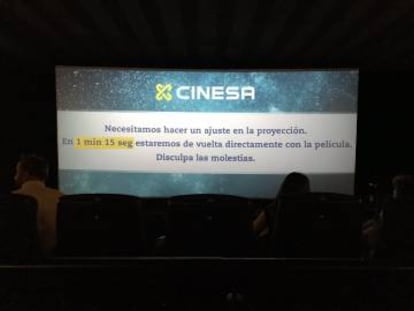Spanish cinemas rebel after studio forces screening of ‘King Arthur’ trailer
Additional content arrived in theaters attached to ‘Wonder Woman,’ provoking angry response

After a string of movie trailers, a cut to silence. This past weekend, audiences of Wonder Woman that went to see the film on certain screens of Spanish movie theater chain Cinesa were presented with a notice that apologized for “technical problems.”

Claiming the projectionists needed to make adjustments to equipment, the image actually served to hide the trailer for King Arthur: The Legend of Excalibur, which will be released in Spain on August 11. The trailer was attached to the Wonder Woman feature presentation by Warner Bros, the studio behind both titles, and – due to its projection through a highly protected Digital Cinema Package (DCP) file – there was no way to cut it out or skip it.
Warner Bros. decided to declare war via social media, firing out a tweet listing theaters where audiences could see their latest blockbuster
As a result, those in charge at Cinesa decided to take matters into their own hands, covering the trailer with the notice. In some theaters, the sound of the ad could still be heard, while in others, audiences still saw the trailer, only without sound. But on most screens, the notice appeared with nothing more than silence accompanying it.
Warner Bros. decided to declare war via social media, firing out a tweet listing theaters where audiences could see their latest blockbuster without Cinesa’s “technical problems.”
Para evitar los "problemas técnicos" de @Cinesa recomendamos disfrutar de la experiencia #WonderWoman en estos cines https://t.co/riPganqiRF pic.twitter.com/iIjIMWAxXs
— Warner Bros. España (@WarnerBrosSpain) June 24, 2017
Can a film distributor impose a trailer on a theater that screens its movies? This is not the only dispute at hand. Warner Bros. is the only major studio that does not take a percentage for every ticket sold for one of its titles, but rather, it charges a fixed price for theaters to rent and show its movies. As a result, theaters cannot offer discounted tickets for movies distributed by Warner Bros., as it would cause them to lose money on their screenings.

On the other hand, King Arthur could very well be Warner Bros.’ biggest flop of the year, as – in the majority of countries where it has already been released – it has failed to attract audiences. Unlike its current hit, Wonder Woman, which has grossed close to €2 billion euros, some estimates anticipate that King Arthur could lose around €140 million for the studio. In other words, it needs a lot of promotion.
Warner Bros. has declined to comment on the matter, issuing only its single tweet over the weekend. Cinesa – a part of Chinese multinational conglomerate Wanda and one of the leading theater chains in Spain – has defended itself in a statement saying: “The distributor of the film, Warner Bros. – acting contrary to the standards of the Spanish and international cinema market – included a trailer for its movie King Arthur: The Legend of Excalibur in the same [DCP] file as Wonder Woman, a departure from normal procedure, in which a film arrives to us without any additional content attached to it.”
Cinesa wants to be able to continue screening trailers that it considers most appropriate Company statement
After unsuccessfully demanding that Warner Bros. remove the trailer, the theater chain opted not to show it: “Cinesa wants to be able to continue screening trailers that it considers most appropriate, selected without regard for the nationality or size of the business distributing the feature presentation, and selected with only our audiences’ interests in mind. We regret the reaction of Warner Bros. via social media.” It concluded: “We will still continue to screen Wonder Woman at our 45 theaters in Spain.”
English version by Henry Hahn.
Tu suscripción se está usando en otro dispositivo
¿Quieres añadir otro usuario a tu suscripción?
Si continúas leyendo en este dispositivo, no se podrá leer en el otro.
FlechaTu suscripción se está usando en otro dispositivo y solo puedes acceder a EL PAÍS desde un dispositivo a la vez.
Si quieres compartir tu cuenta, cambia tu suscripción a la modalidad Premium, así podrás añadir otro usuario. Cada uno accederá con su propia cuenta de email, lo que os permitirá personalizar vuestra experiencia en EL PAÍS.
¿Tienes una suscripción de empresa? Accede aquí para contratar más cuentas.
En el caso de no saber quién está usando tu cuenta, te recomendamos cambiar tu contraseña aquí.
Si decides continuar compartiendo tu cuenta, este mensaje se mostrará en tu dispositivo y en el de la otra persona que está usando tu cuenta de forma indefinida, afectando a tu experiencia de lectura. Puedes consultar aquí los términos y condiciones de la suscripción digital.








































